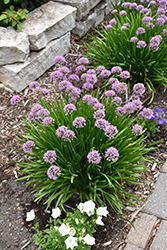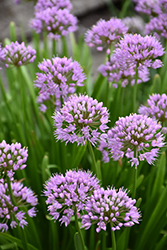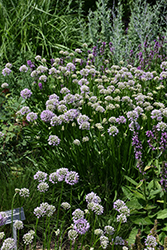Summer Beauty Ornamental Chives
Allium tanguticum 'Summer Beauty'
Plant Height: 10 inches
Flower Height: 20 inches
Spread: 10 inches
Sunlight:
![]()
Hardiness Zone: 4
Other Names: Flowering Onion
Description:
Interesting 2 inch lilac-pink globe flowers emerge from narrow strappy dark-green foliage; attracts butterflies; plant close together for a massed effect
Ornamental Features
Summer Beauty Ornamental Chives features bold balls of lightly-scented pink flowers at the ends of the stems from early to late summer. The flowers are excellent for cutting. Its fragrant sword-like leaves remain dark green in color throughout the season.
Landscape Attributes
Summer Beauty Ornamental Chives is an open herbaceous perennial with tall flower stalks held atop a low mound of foliage. Its relatively fine texture sets it apart from other garden plants with less refined foliage.
This is a relatively low maintenance plant, and should only be pruned after flowering to avoid removing any of the current season's flowers. It is a good choice for attracting butterflies to your yard, but is not particularly attractive to deer who tend to leave it alone in favor of tastier treats. It has no significant negative characteristics.
Summer Beauty Ornamental Chives is recommended for the following landscape applications;
- Mass Planting
- Rock/Alpine Gardens
- Border Edging
- General Garden Use
- Groundcover
- Herb Gardens
Planting & Growing
Summer Beauty Ornamental Chives will grow to be about 10 inches tall at maturity extending to 20 inches tall with the flowers, with a spread of 10 inches. It grows at a medium rate, and under ideal conditions can be expected to live for approximately 5 years. As an herbaceous perennial, this plant will usually die back to the crown each winter, and will regrow from the base each spring. Be careful not to disturb the crown in late winter when it may not be readily seen!
This plant should only be grown in full sunlight. It does best in average to evenly moist conditions, but will not tolerate standing water. It is not particular as to soil type or pH, and is able to handle environmental salt. It is highly tolerant of urban pollution and will even thrive in inner city environments. This is a selected variety of a species not originally from North America. It can be propagated by division; however, as a cultivated variety, be aware that it may be subject to certain restrictions or prohibitions on propagation.


